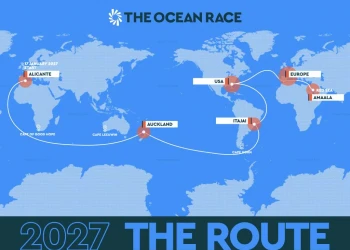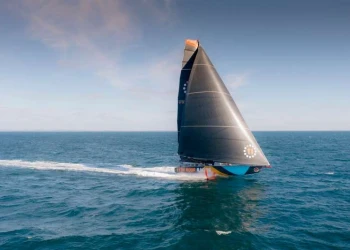
Amory Ross, 11th Hour Racing, The Ocean Race
Earning it on board 11th Hour Racing Team
From 11th Hour Racing Team:
As the fleet enters day 25 of racing, there is no skirting around the obvious red and orange weather conditions on The Ocean Race tracker indicating strong winds and no doubt rough sea states. The epitome of classic Southern Ocean conditions.
“There’s some pretty strong weather in between us and Cape Horn right now,” explains Navigator Simon Fisher (Si Fi) onboard. “This is often the case and always makes it feel like such an achievement when you get there. That left turn to go north after Cape Horn (which indicates the end of the Southern Ocean) will be very welcome by everyone, but we’re not there yet. It’s always the case with this leg that you enjoy it so much more in hindsight!”

Update from Amory Ross onboard:
With Point Nemo now behind us the page turns to the next checkpoint on the map, and it’s the big one. Cape Horn. Certainly the biggest milestone of this race, and likely in all of offshore sailing.
There is no debating what it represents and what it stands for, but that’s a reputation it has earned the hard way. The weather in the Southern Ocean and the weather at the Horn can be terrible and it has tested many a sailor for centuries. It seems fitting then that this, our own long journey through all of the south, will end with our toughest test yet. The biggest low of this leg and potentially the worst weather of this race are just around the corner. And with Chile to the east and the Horn to the south, there is no escaping it. We are on a collision course with 35 knots of wind, at a minimum, and waves from the continental shelf, and it will be exactly the kind of weather we came down here expecting to see. Unfortunately for us, Neptune is saving his best work for last.
We remind ourselves often of the mantra. Chill. Keep the boat and the people safe first and foremost. Let things unfold in front of us and take advantage of opportunities as they present themselves, but don’t push and don’t try to force them into happening. At daybreak we went to two reefs, skipping the damaged first reef, and are likely to be hedging more north than south when it comes to the next gybe. The farther north you sail the more distance you sail, but you can also minimize the time spent in the strong winds and also minimize the strength of the winds. North is long but safe. South is short but risky.

That’s the next gamble for the fleet and it will be interesting to see who goes south first. In the interest of responsible and rational decision making, I don’t think it will be us. Holcim have the most to lose after leading this leg from the start, but also the biggest points cushion to fall back on. Malizia seem content with their pace but is there an issue with their masthead inventory after the Horn? Do they want a head start? And Biotherm. Always a wild card and not afraid to go on their own. Who knows!
What we do know is that today is about thorough preparation and maybe a last good sleep or two before the final push to the south’s exit begins. It’s not going to be easy but in a lot of ways, that’s exactly why we all want to be here. Cape Horn must be earned.As the fleet enters day 25 of racing, there is no skirting around the obvious red and orange weather conditions on The Ocean Race tracker indicating strong winds and no doubt rough sea states. The epitome of classic Southern Ocean conditions.
“There’s some pretty strong weather in between us and Cape Horn right now,” explains Navigator Simon Fisher (Si Fi) onboard. “This is often the case and always makes it feel like such an achievement when you get there. That left turn to go north after Cape Horn (which indicates the end of the Southern Ocean) will be very welcome by everyone, but we’re not there yet. It’s always the case with this leg that you enjoy it so much more in hindsight!”







